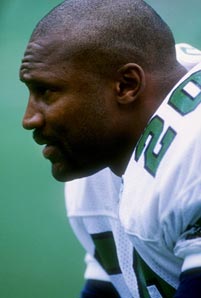 Last week, the New York Times featured a troubling story about an expert's conclusion that former NFL Player Andre Waters' suicide may have been the result, at least in part, of concussions sustained during his football career.
Last week, the New York Times featured a troubling story about an expert's conclusion that former NFL Player Andre Waters' suicide may have been the result, at least in part, of concussions sustained during his football career.
While I hate to sound like a league defender, I wish the information on which this story was based had come from different sources...
The expert cited in the story is Bennet Omalu. According to the Times,
The neuropathologist, Dr. Bennet Omalu of the University of Pittsburgh, [is] a leading expert in forensic pathology.This may be a bit of an overstatement, and is clearly misleading in terms of Dr. Omalu's institutional affiliation. According to Pitt's web-site, Omalu's "University Relationship" is that of "Volunteer (with ER)." That is to say, he's not a professor or university employee, as far as I can tell. Dr. Omalu is a "Forensic Expert" for a "Medico-Legal Consulting and Autoposy Service Company" called Neo-Forenxis; according to another Pitt web site, he is an Allegheny County Coroner and a former (2000-2002) clincial fellow. Moreover, Dr. Omalu may have been predisposed to reach the conclusion he did, given his previous conclusions in similar cases. Clearly, the doc has a theory and here was a chance to push it.
The Times story also indicates that Dr. Omalu's investigation was initiated after prodding by former Harvard football player and professional wrestler Chris Nowinski, author of a book called Head Games: Football's Concussion Crisis, as well as this myspace page and this fan page.
This is not to say that Dr. Omalu's conclusions are not based on some interesting developing science linking brain injury and depression. But it looks to me like this is a quasi-professional expert witness whose credentials have been a bit over-hyped by the Times. Moreover, while Nowinski may mean well, he does have a bit of a financial interest (in selling books) that would be served by both this NYT story and allegations that a former player's suicide (already a scandalous matter) resulted from, guess what, the very thing he's writing about. It's also fair to say that the credibility of a professional wrestler is, well, not exactly unimpeachable.
In any event, should Dr. Omalu's concerns be substantiated, the legal issues posed will be intriguing. What liability, if any, would attach to a team, or a team physician, for negligence or other tortious conduct leading to suicide? At one point in time, suicide was considered to be a superseding intervening act that severed the chain of proximate causation between "wrongful act" and "unfortunate result". The modern trend, however, allows suits against those who increase the risk of suicide, fail to prevent suicide or detect suicidal tendencies where suicide was a foreseeable outcome. Typically, these defendants are manufacturers of brain-altering medication or psychologists, psychiatrists and other therapists.
But why not a team, a league, or a team physician? If new science demonstrates a connection betweend depression and mild brain trauma, a team physician (now typically labeled an "independent contractor" to insulate the team from liability) who clears the player to return to play might bear some liability exposure. As one leading scholar explains:
Medical clearance recommendations should be within the bounds of accepted or reasonable sports medicine practice and governed by the team physician's paramount obligation to protect the competitive athlete from medically unreasonable risks of harm. To avoid potential legal liability, the team physician should refuse clearance of an athlete if she believes there is a significant medical risk of harm from participation, irrespective of the team's need for the player or the player's personal motivations.Matthew J. Mitten, Emerging Legal Issues in Sports Medicine, 76 ST. JOHN'S LAW REVIEW 5 (Winter 2002).
Is it fair to say that Waters would be barred by assumption of risk or other "limited duty" or "no duty" rules applicable in professional sports? As one psychology blogger notes,
Waters seemed to recognize the risks of his position. “Playing strong safety in the NFL, it’s either kill or be killed like ‘Survivor,’” Waters said.For the plaintiff lawyer's perspective, check out the Brain Injury Blog. HT to Toledo psychology professor and law student John McSweeney for pointing me in this direction.





0 comments:
Post a Comment